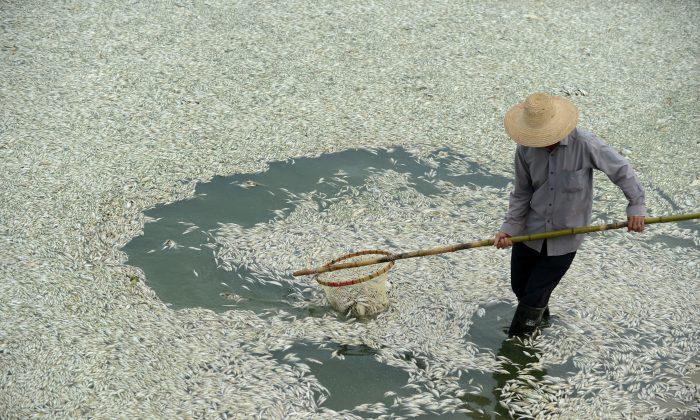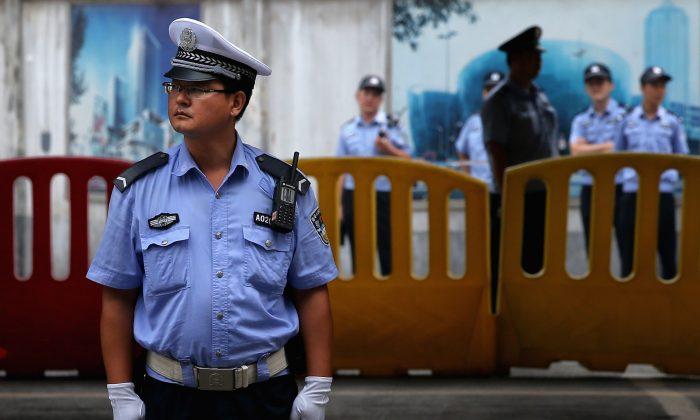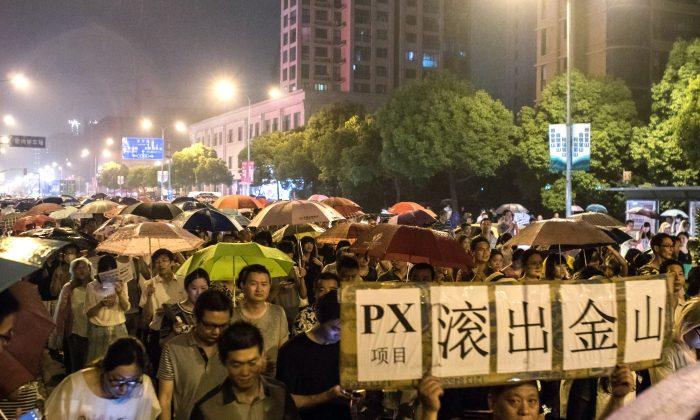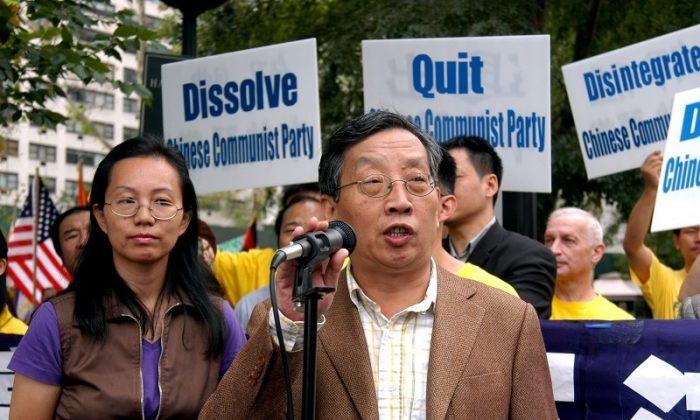Mrs. Chen, a resident of Huaian City, was distinctly out of place on the “Government Hotline” television program broadcast from Jiangsu Province late last month. Her thick local accent, sunburnt face, and desperate grasping for the microphone identified her immediately as a peasant from the countryside.
But she had been invited onto the program to demonstrate something crucial to viewers and local officials, who were also present: The water in the Chami River that flowed by her house ran black. Not dark brown—but as black as black ink.
She was called onto the stage and produced a small spring-water bottle filled with the black liquid. The host gingerly opened it, took one whiff and recoiled. He passed it around to others who had the same reaction.
A struggle then ensued as Chen commandeered the microphone and indecorously fell to her knees, pleading for the government to do something. “Please help me to solve the pollution!” she cried out. “We are old, we can die, but our children’s hands have started to change. Their skin has changed!”
The female host, flustered, managed to wrest the microphone back and helped Chen to her feet. Mrs. Chen was excused, and the local Communist Party dignitaries were summoned to respond.
“This is a deep lesson,” said Shi Weidong, a plump, bespectacled official who stood up in the front row of the audience. Shi is the director of the Environmental Protection Bureau in the district of Qingpu. His job is to keep the Chami River clean.
“I truly wasn’t aware of it. … I’m so shocked,” he said. “Those companies that spread the pollution must be punished.” (In fact, local residents say they have complained repeatedly, according to the Legal Evening News.)
Officials with the Chinese Communist Party—even those who merely head local environmental bureaus—do not typically appear before the public to receive criticism and make apologies, however faint.
The episode was a direct demonstration of the graveness of the pollution of China’s waterways.
Poisoned Rivers
Over 1,700 incidents of water pollution are reported every year, according to data compiled by the well-known Chinese publication, 21 Century Business Herald. The rate of such incidents has risen rapidly over the last decade, the report said.
Just last month, two large-scale incidents raised public anxiety about water quality.
On April 23, the government of Wuhan, a populous city in central China’s Hubei Province, announced that it would stop the water supply to the city due to excessive ammonia nitrogen, a toxic pollutant. Over 300,000 residents and hundreds of food companies were impacted.
Lanzhou, in northwestern China’s Gansu Province, also reported excess levels of benzene, a toxic chemical, in the river that the drinking water supply draws from. Panicked residents rushed to stores for bottled water. It turned out that the benzene may have been present for months, undetected.
New drinking water standards rolled out in 2006 by China’s National Health and Family Planning Commission broadly match those recommended by the World Health Organization, but inspection in China is much more lax.
Experts said that light punishment of polluters, and a general culture of lawlessness, contribute to the severity of the problem.
“The punishment for these companies that pollute water is too light,” said Wang Yongshang, a water pollution expert in Beijing, in an interview with the New York-based New Tang Dynasty Television. “China doesn’t have a strict law to punish these companies, and the Chinese people have no right to vote for anything. It’s all decided by the officials.”
Underground Pollution
A new report by China’s Ministry of Land and Resources said that nearly 60 percent of 4,778 underground water monitor points show “poor quality” and “extremely poor quality” water.
Experts at China Geological Survey, a state-led research institute, said at a conference in 2010 that 90 percent of China’s underground water sources are polluted to one degree or another, while 60 percent are seriously polluted, according to state-run Xinhua.
Underground water constitutes a third of the total water sources of China, and supplies the drinking water for nearly 70 percent of the population.
Such rapid destructive pollution of the underground water supply has deeply worried Chinese.
“Following this speed of pollution, it won’t take too long for China’s underground water to be entirely and severely polluted,” wrote Li Shangyong, a Chinese economic professor, in a recent article “China’s Environmental Situation is Extremely Grim,” published in the China Reform magazine.
Li said that underground water pollution stems from the use of chemical fertilizers, toxic metals, including cadmium, nickel, copper, arsenic, mercury, lead, DDT, and more. Rice and vegetables grown in those conditions are also polluted. Such fundamental pollution is difficult to reverse, Li said, and could take decades or a century.
“When the time comes,” Li wrote, “both we and future generations will lose our basis of survival.”





Friends Read Free